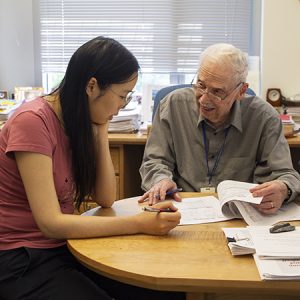 Guest post by Yue Cao, new assistant professor of electrical and computer engineering
Guest post by Yue Cao, new assistant professor of electrical and computer engineering
I was born in China, raised in Dalian, and went to school there until 10th grade when I said goodbye to my dear friends at Dalian Yuming High School and moved to the U.S. While in China, I enjoyed math, science, and English, thanks to my academically-oriented family. I was involved with all sorts of academic Olympiads and achieved several awards, most notably, first place individual in Hua Luo-geng National Math Cup in Dalian city, and first prize (top 1%) in various Liaoning provincial math, physics, English, and computer competitions. Pretty nerdy huh? Well that was the definition of a good student in China. I’m glad I also learned to play the accordion starting at five years old. That definitely helped me appreciate arts and music and relax in my spare time. It was not until I came to the U.S. that I realized there could be much more to grow as a well-rounded person.
It was not an easy decision to come to the U.S. during high school because I could have gone to a top university in China, and that time (2005) it was not yet popular for Chinese students to have high school or even undergraduate education in the U.S. But my mom was studying for her Ph.D. at the University of Tennessee (UTK) and wanted me to experience a U.S. education. I attended West High School in Knoxville where I met many great friends, learned to speak better English, and discovered other interests in life. I utilized my math skills and helped my high school win second team overall in the state-wide math competition, which was unheard of for this traditionally athletic oriented school. The individual first place award I received led to a four-year tuition-waiver scholarship to attend UTK.
I still liked math, but realized I was more interested in its application, so I decided to major in electrical engineering because it was a challenging subject where I could be part of advancing technology. I was fortunate that UTK has a top power engineering program, which aligned well with my interests in circuits, math, and control. I credit my undergraduate adviser, Prof. Leon Tolbert, for developing my interest in power electronics and systems when I was looking for a summer research fellowship project. I further developed my expertise at University of Illinois at Urbana-Champaign (UIUC) advised by Prof. Philip Krein.
During my American education, I found out the importance of being a well-rounded person. In this fast-paced society, a successful person not only is technologically savvy, but also demonstrates strong leadership, teamwork, communication, and visioning skills, and has some professional and non-professional passions in life. To achieve these objectives, I was involved in and held leadership roles in several organizations, such as a conference organizing committee, a professional student chapter, an engineering professional fraternity, as well as several student team projects. The UTK’s athletic environment greatly influenced me to pick up tennis my sophomore year and I fell in love with it. I also love to travel, and have visited 49 states and 13 countries. There is an old Chinese saying, “traveling thousands of miles is just as educating as reading thousands of books.”
I’m excited to be at Oregon State University as the fast-booming Pacific Northwest region is drawing industry and academia’s attention. With an established industry in ground vehicles and aerospace applications going into full electrification in the next decades, along with the strong renewable energy initiative, there is no doubt that the region will attract investments and talent to the upcoming power and energy revolution.
This year Oregon was honored to host the 10th anniversary IEEE ECCE (Energy Conversion Congress and Expo, which is the premier international energy conversion annual conference sponsored by the IEEE Power Electronics Society and Industry Applications Society. I organized multiple tutorial and panel sessions with particular interests of Oregon and Washington’s industry members, such as Daimler, Intel, MicroSemi, Boeing, Amazon, and Microsoft. The conference specifically featured a plenary session talk on Oregon’s unique effort in wave energy conversion.
Oregon State, a leading power and energy research university, and the only school with a 750 kW lab facility on the West coast, is ready to tackle new research challenges and nurture the next generation young engineers.










